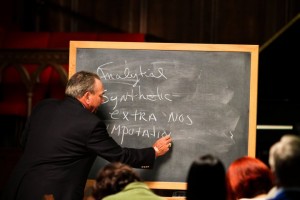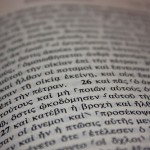 Four quotes from Martin Luther:
Four quotes from Martin Luther:
“Justification by faith alone is the article of the standing or falling Church.”
“This doctrine [justification by faith alone] is the head and the cornerstone. It alone begets, preserves, and defends the church of God; and without it the church of God cannot exist for one hour. For no one who does not hold this article or, to use Paul’s expression, this ‘sound doctrine’ (Titus 2:1) is able to teach aright in the church or successfully to resist any adversary… this is the heel of the Seed that opposes the old serpent and crushes its head. That is why Satan, in turn, cannot but persecute it.”
“Whoever departs from the article of justification does not know God and is an idolater… For when this article has been taken away, nothing remains but error, hypocrisy, godlessness, and idolatry, although it may seem to be the height of truth, worship of God, holiness, etc… If the article of justification is lost, all Christian doctrine is lost at the same time.”
“When the article of justification has fallen, everything has fallen. Therefore it is necessary constantly to inculcate and impress it, as Moses says of his Law (Deut. 6:7); for it cannot be inculcated and urged enough or too much. Indeed, even though we learn it well and hold to it, yet there is no one who apprehends it perfectly or believes it with a full affection and heart. So very trickish is our flesh, fighting as it does against the obedience of the spirit.”

Justification by faith alone is the article upon which the church stands or falls, the main hinge on which religion turns. Yet as important as justification is, many Christians remain confused about it, and others actively blur its features. This is the case not merely with Christians in general but so called evangelical leaders also.
Over the last few months I have had private correspondence with a number of Christian leaders and ministers, both here in the USA and oversees, as I have challenged them to be clear on this issue. Sadly, I have not been successful at all. In many churches and ministries, the Gospel is often assumed but not proclaimed. That is a great scandal as well as a great tragedy. Continue reading →
 This online resource is an excellent way to interact with the Greek text of the New Testament with advanced searches, parsing, interlinears, etc. It’s only $10 for lifetime access, and can do most of the things that you’d pay hundreds of dollars for elsewhere. (The price goes up to $14.99 on May 1).
This online resource is an excellent way to interact with the Greek text of the New Testament with advanced searches, parsing, interlinears, etc. It’s only $10 for lifetime access, and can do most of the things that you’d pay hundreds of dollars for elsewhere. (The price goes up to $14.99 on May 1).
 Four quotes from Martin Luther:
Four quotes from Martin Luther:
 Rev. David Wilkerson, founder of Teen Challenge, founding pastor of the 8,000 member Times Square Church in New York City and author of the popular book “The Cross and the Switchblade”, was killed Wednesday in a car crash in Texas. He was 79.
Rev. David Wilkerson, founder of Teen Challenge, founding pastor of the 8,000 member Times Square Church in New York City and author of the popular book “The Cross and the Switchblade”, was killed Wednesday in a car crash in Texas. He was 79.